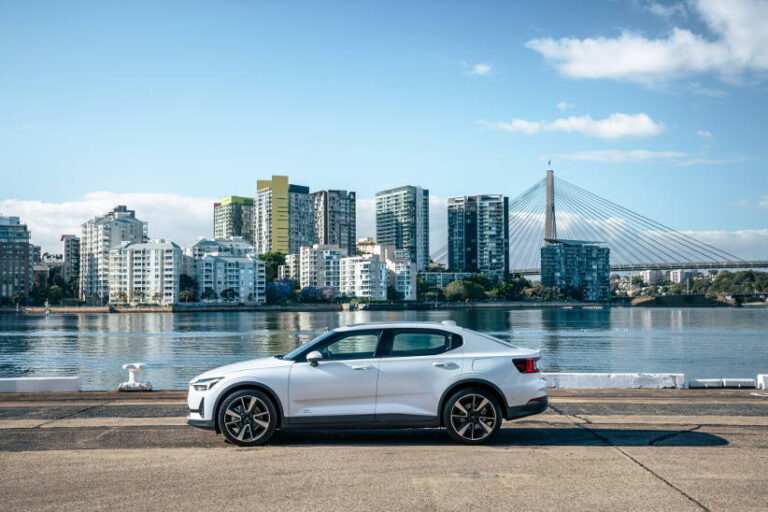Polestar made a big impression at the National Public Sector Fleet Managers’ Conference in 2022 with their approach to zero emissions vehicle production. Most fleets are focused on reducing vehicle emissions, and possibly achieving net-zero, but Polestar is challenging the automotive world to manufacturer a climate-neutral vehicle.
In January I caught up with Samantha Johnson, Managing Director at Polestar Australia, to talk about their approach to fleet business and how they are changing the discussion on Scope 1, 2 and 3 emissions for Fleet Managers. I started by suggesting she was possibly the busiest person in the industry last year.
“There’s certainly been a been a lot on. It’s been a very exciting time, there’s so much happening in the industry and for Polestar coming into the market at this time, it’s just perfectly timed and we’re trying to make as much of a contribution as we can to towards sustainability and really making sure we’re influencing others to do the right thing,” replied Johnson.
Polestar launched in Australia in late 2021 and started taking orders in February 2022 achieving over 1,500 deliveries for the year which is an outstanding achievement for a new brand that was taking orders online without a dealer network and challenging the traditional new car sales model.
“We had quite a good order bank, but you know with any new brand or new product coming to market, new systems, new partners, we had quite a lot to work through,” explained Johnson.
“So it was quite a busy time, but since that start of sales we really have focused a lot on customer experience. Everything we’ve done, every month, we reset and have a look at things, what’s going well and what’s not, what can we improve. And every month we’ve been improving.”
The model year changeover early in 2022 (which meant orders had to be paused) presented some challenges due to the high demand though Johnson and the team worked through the issues, learning along the way to ensure customers received a great experience.
“We do things a little bit differently with our partners who are working in new ways, ” says Johnson. “So it’s a big, big learning curve for everyone. But we’ve got a really great team at Polestar. They’re really just so engaged in what they do and they really care about the customer. And I think that’s what makes a big difference. When anything comes up, they’ll do anything to help a customer out, each individual customer, and make sure that they’re looked after.”
Electric vehicles are still a novelty for most people so unless they are committed to buying one, they won’t be seeking out information or visiting a dealership. Polestar has read the zeitgeist of the market and taken the approach to share information rather than sell their cars with opportunities for people to learn more in between running errands and shopping for groceries.
“We do have retail locations for test drive and handovers,” says Johnson. “And we also opened up our first flagship retail location at Chadstone Shopping Centre in Melbourne. We’ve had so many people coming in and they just want to know more. They ask, how do I charge my car? What’s the range? What’s the performance like of the car? What does it feel like?”
“And there’s no hard sell within the showroom. The team are product specialists. They’ll tell you anything about the brand and about the cars. You can organise a test drive and handover from there, or you can book that online, but no-one negotiates a deal with you. No one is making assumptions based on what you’re wearing as to whether you’re a decision maker or not, and whether you’re wealthy or not. There’s none of that. It’s just, how can I help you? What would you like to know?”
The service levels and customer experience apply to fleet customers as well. Polestar has a different ordering process for fleet customers and works with each partner to accommodate the systems and process required for B2B sales.
“Fleets are an important part of Polestar globally and locally in Australia,” confirms Johnson. “A lot of businesses and governments are mandating EV’s. They want to be more sustainable and Polestar is the strongest brand in the auto industry who is tangibly working towards a net zero emissions vehicle by 2030. And across the company, we’ll be climate-neutral by 2040.”
“Companies and government really value that sustainability work we are we are doing. So we already had that very strong push towards fleet. Now that we have the FBT exemptions in place that is reaching more than just businesses and government. That’s saying to consumers, you’re going to save a lot of money if you salary package your vehicle through a novated lease. As a result, we’re finding the demand is higher again, it’s really improving.”
“We’ve got some really good support from government and organisations. For example, QFleet is very, very supportive. For Polestar, fleet is a very strong focus for us.”
According to Johnson, Hertz could take more electric cars if the airports had more charging infrastructure. Rideshare drivers are another type of fleet that is realising the benefits of zero emission motoring with Polestar.
It’s clear from our conversation that consumers and fleets now have an extra layer of evaluation when looking to buy an electric vehicle. Buying an EV will reduce your Scope 1 emissions but if your emissions reduction journey has matured to Scope 2 and 3 emissions, then Polestar is making the choice easy for you.






